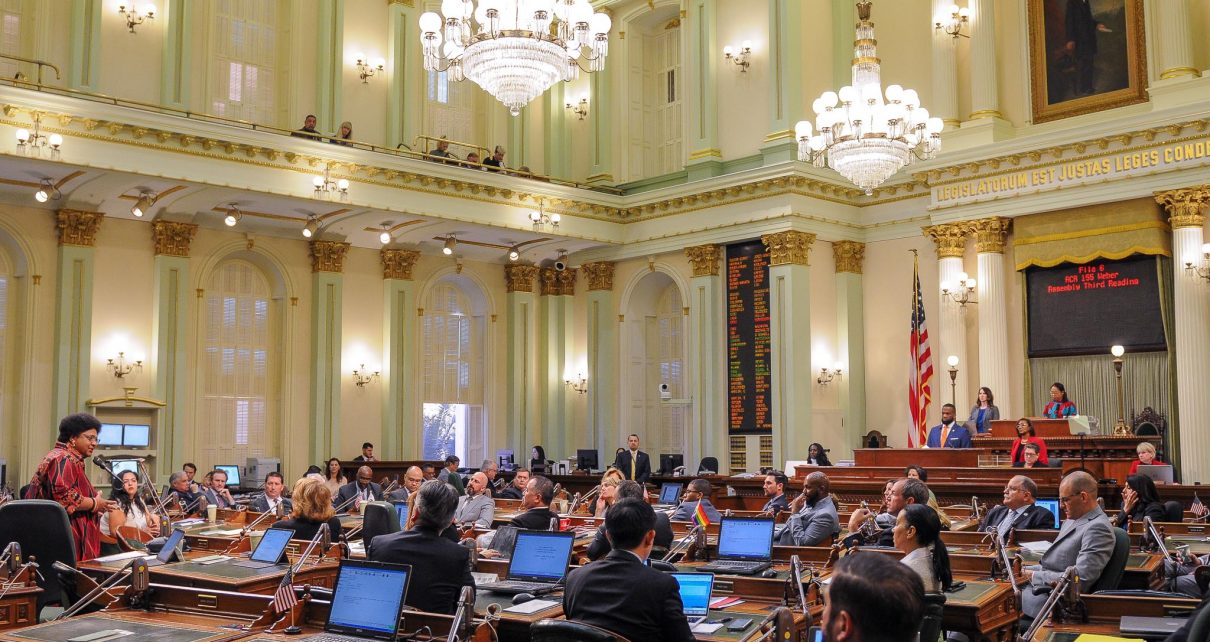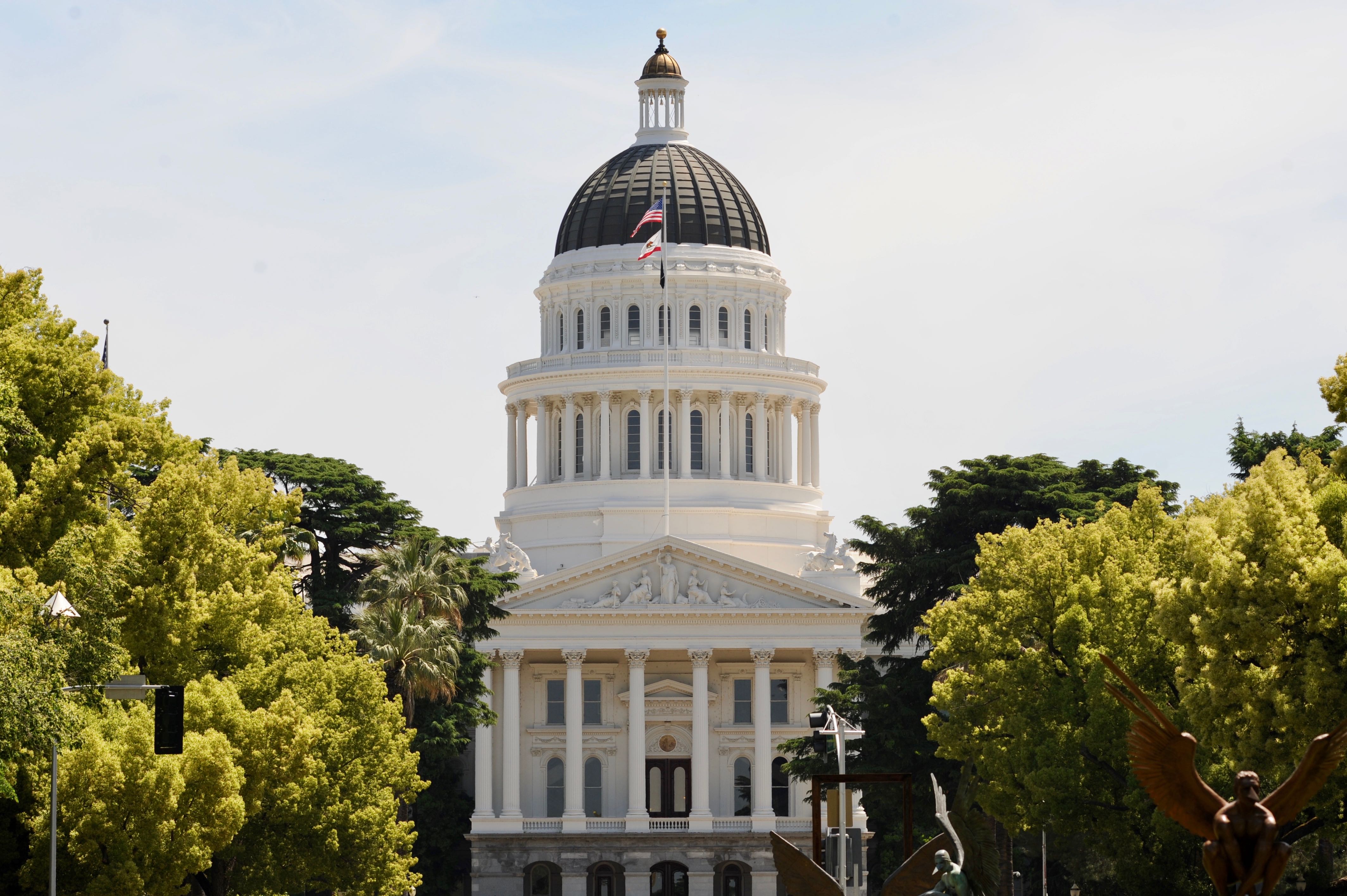
California State Assembly in Session. (Photo: Kevin Sanders for California Globe)
Frequently Asked Questions about California’s Lobbying Laws
What is ‘influencing legislative or administrative action’?
By Chris Micheli, October 29, 2023 7:55 am
For those not familiar, I put together the following questions and answers for those queries that are most often posed regarding California’s lobbying laws.
Does the Political Reform Act (PRA) include procurement lobbying in the definition of “administrative action”? No. As a result, purely procurement work does not require registration under the PRA.
What does “administrative action” mean? In general, it refers the proposal, drafting, development, consideration, amendment, enactment, or defeat by any state agency of any rule, regulation, or other action in any ratemaking proceeding or any quasi-legislative proceeding.
What does “ratemaking proceeding” mean? For proceedings before the PUC, it is any proceeding in which it is reasonably foreseeable that a rate will be established.
What does “quasi-legislative proceeding” mean? For proceedings before the PUC, any proceeding that involves consideration of the establishment of a policy that will apply generally to a group or class of persons, including, but not limited to, rulemakings and investigations that may establish rules affecting an entire industry.
Who are “agency officials”? They include any member, officer, employee, or consultant of any state agency who as part of that person’s official responsibilities participates in any administrative action in other than a purely clerical, secretarial, or ministerial capacity.
What is a “gift”? It is generally any payment that confers a personal benefit on the recipient, to the extent that consideration of equal or greater value is not received and includes a rebate or discount in the price of anything of value unless the rebate or discount is made in the regular course of business to members of the public without regard to official status.
What are not considered a “gift”? Informational material such as books, reports, pamphlets, calendars, or periodicals. Gifts which are not used and which, within 30 days after receipt, are either returned to the donor or delivered to a nonprofit entity exempt from taxation. Gifts from an individual’s spouse, child, parent, grandparent, grandchild, brother, sister, parent-in-law, brother-in-law, sister-in-law, nephew, niece, aunt, uncle, or first cousin or the spouse of any such person; campaign contributions; any devise or inheritance; and, personalized plaques and trophies with an individual value of less than $250.
What is “influencing legislative or administrative action”? It means promoting, supporting, influencing, modifying, opposing or delaying any legislative or administrative action by any means, including but not limited to the provision or use of information, statistics, studies or analyses.
What is “legislative action”? It means the drafting, introduction, consideration, modification, enactment, or defeat of any bill, resolution, amendment, report, nomination, or other matter by the Legislature or by either house or any committee, subcommittee, joint or select committee thereof, or by a Member or employee of the Legislature acting in that person’s official capacity.
Does “legislative action” also mean the actions of the Governor in approving or vetoing any bill? Yes.
Who is a “legislative official”? Any employee or consultant of the Legislature whose duties are not solely secretarial, clerical or manual.
What is a “lobbying coalition”? A group of 10 or more persons formed primarily to influence legislative or administrative action, whose members make payments to the coalition for sharing the expenses of employing a lobbyist or contracting for the services of a lobbying firm.
What is a “lobbying firm”? Any business entity, including an individual contract lobbyist, which receives compensation either for the purpose of influencing legislative or administrative action on behalf of any other person, or to communicate directly with any elective state official, agency official, or legislative official for the purpose of influencing legislative or administrative action on behalf of any other person.
Who is a “lobbyist”? Any individual who receives $2,000 or more in economic consideration in a calendar month, or whose principal duties as an employee are, to communicate directly or through that individual’s agents with any elective state official, agency official, or legislative official for the purpose of influencing legislative or administrative action.
Is a “placement agent” a lobbyist? Yes. It is an individual directly or indirectly hired, engaged, or retained by, or serving for the benefit of or on behalf of, an external manager or an investment fund managed by an external manager, and who acts or has acted for compensation as a finder, solicitor, marketer, consultant, broker, or other intermediary in connection with the offer or sale to a state public retirement system in California or an investment vehicle.
Who is a “lobbyist employer”? Any person, other than a lobbying firm, who employs one or more lobbyists for economic consideration for the purpose of influencing legislative or administrative action, or contracts for the services of a lobbying firm for the same purpose.
What is a “payment to influence legislative or administrative action”? It means any of the following types of payment: direct or indirect payment to a lobbyist; payment in support or assistance of a lobbyist’s activities; payment which directly or indirectly benefits any elective state official, legislative official, or agency official; payment, including compensation, payment, or reimbursement for the services, time, or expenses of an employee, for or in connection with direct communication with any elective state official, legislative official, or agency official; payment for or in connection with soliciting or urging other persons to enter into direct communication with any elective state official, legislative official, or agency official.
Who has to register with the Secretary of State? Lobbying firms, lobbyist employers, and lobbying coalitions.
When do lobbying firms and employers have to file their registration statements? Every lobbying firm and lobbyist employer who is required to file a registration statement must register with the Secretary of State no later than 10 days after qualifying as a lobbying firm or lobbyist employer.
Does the Secretary of State charge for filing registration statements? Yes, the Secretary of State charges each lobbying firm and lobbyist employer required to file a registration statement a fee of $50 per year for each lobbyist required to be listed on its registration statement.
What is included in a lobbyist certification? A recent photograph of the lobbyist; the full name, business address, and telephone number of the lobbyist; a statement that the lobbyist has read and understands the prohibitions in law; and, a statement that the lobbyist has completed or will complete the lobbyist ethics course.
What is included in the registration of a lobbying firm? The full name, business address, and telephone number of the lobbying firm; a list of the lobbyists who are partners, owners, officers, or employees of the lobbying firm; the lobbyist certification of each lobbyist in the lobbying firm; and, detailed information for each person with whom the lobbying firm contracts to provide lobbying services.
What is included in the registration for a lobbyist employer or a lobbying coalition? The filer’s full name, business address, email address, and telephone number; information sufficient to identify the nature and interests of the filer; a list of the state agencies whose legislative or administrative actions the lobbyist employer or coalition will attempt to influence; a list of the lobbyists who are employed by the lobbyist employer or coalition; and, the lobbyist certification of each lobbyist employed.
What does the Secretary of State do with the information listed on any registration statement? All filings must be made publicly available on the Internet as soon as possible after receipt by the SOS.
Is there a directory of lobbyists available? Within 140 days after the commencement of each regular session of the Legislature, the Secretary of State must publish a directory of registered individual lobbyists, lobbying firms, and lobbyist employers. The SOS must also maintain an online version of this directory.
What are the recordkeeping requirements for lobbyists, lobbying firms, and lobbyist employers? They must keep detailed accounts, records, bills, and receipts.
What are “activity expenses”? It means any expense incurred or payment made by a lobbyist, lobbying firm, lobbyist employer, or arranged by a lobbyist or lobbying firm, which benefits in whole or in part any elective state official, legislative official, agency official, state candidate, or a member of the immediate family of one of these individuals.
What information is required to report activity expenses? The date and amount of each activity expense; the full name and official position, if any, of the beneficiary of each expense, a description of the benefit, and the amount of benefit; and, the full name of the payee of each expense.
What statement must be included in any written or printed invitation to an elected state officer, legislative official or agency official? “Attendance at this event by a public official will constitute acceptance of a reportable gift.”
What is an “issue lobbying advertisement”? It means any advertisement made for purposes of influencing a clearly identified legislative or administrative action, including an advertisement soliciting or urging a person to communicate directly with an elective state official, agency official, or legislative official for the primary purpose of attempting to influence a clearly identified state legislative or administrative action.
What must be included in an issue lobbying advertisement? It must clearly and conspicuously identify the person that authorized and paid for the advertisement by specifying certain disclosures.
What is the gift limitation for lobbyist or firms? It is unlawful for a lobbyist, or lobbying firm, to make gifts to one person aggregating more than $10 in a calendar month, or to act as an agent or intermediary in the making of any gift, or to arrange for the making of any gift by any other person.
Is it unlawful for any person knowingly to receive any unlawful gift? Yes.
Are lobbyists prohibited from engaging in certain activities? Yes, they cannot do anything with the purpose of placing any elected state officer, legislative official, agency official, or state candidate under personal obligation to the lobbyist. They cannot deceive or attempt to deceive any elected state officer, legislative official, agency official, or state candidate with regard to any material fact pertinent to any pending or proposed legislative or administrative action. They cannot cause or influence the introduction of any bill or amendment thereto for the purpose of thereafter being employed to secure its passage or defeat. They cannot attempt to create a fictitious appearance of public favor or disfavor of any proposed legislative or administrative action or to cause any communication to be sent to any elected state officer, legislative official, agency official, or state candidate in the name of any fictitious person or in the name of any real person, except with the consent of such real person. They cannot represent falsely, either directly or indirectly, that the lobbyist or the lobbying firm can control the official action of any elected state officer, legislative official, or agency official. They cannot accept or agree to accept any payment in any way contingent upon the defeat, enactment, or outcome of any proposed legislative or administrative action.
Are there persons who are excluded from the lobbying laws? The laws do not apply to any elected public official acting in the official’s official capacity, or any employee of the State of California acting within the scope of the employee’s employment; any newspaper or other periodical of general circulation, book publisher, radio or television station; or a person when representing a bona fide church or religious society solely for the purpose of protecting the public right to practice the doctrines of such church.
- Conservation Banks - February 22, 2026
- Mergers of Unincorporated Associations - February 21, 2026
- A Historic Look at Bill Introductions in the California Legislature - February 21, 2026




